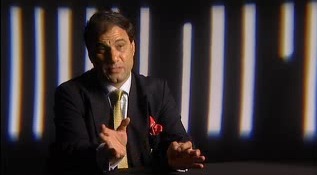Lord Bilimoria on leadership.

Lord Bilimoria is the founder of Cobra Beer, having previously worked in audit, tax, training, and accounting at various organizations.
I took away the following points from watching Bilimoria’s ten 4-minute videos on the 50 Lessons website.
Starting from nothing always ‘against all odds’
Every time you start from nothing there will always be big sacrifices to make and involve frustrations. The key thing is that during hard times you don’t give up. Have faith in both your ideas and yourself. Long-term goals are important – as is instilling the belief that as an organization you are going to reach those goals.
Consult end-users
Never take forward ideas without checking them out with consumers or end-users. Bilimoria gives the example of his beer being called Panther until last-minute informal customer surveys showed that they didn’t like the name. Instead of ignoring this research, the organization changed the name of the beer (after feedback) and it was a success.
The lesson from this is that you come up with the ideas, but you should always check these with the end-users before going ahead. You may not be able to have large, formal research programmes, but you can always carry out informal research.
Dissatisfaction leads to innovation
Channeling dissatisfaction can lead to the generation of new ideas. Every time a good idea comes along, people always ask, ‘why didn’t someone do that before.’ This is usually because you have to ‘make the leap’ to cross the ‘credibility gap’ (which is that nobody knows you or your ideas). People will only let you close that gap if you have confidence and passion – and leads to same on their part. Trust your own judgement as many ideas overlooked as seeming too straightforward.
Contant innovation is a must
It is important to be innovating constantly as other people will always copy what you do. In order to do this you need not only have right environment within your organization but work with the best advisers; this gives you the edge. In addition, the ways in which you work with these advisers, making them part of your team, is important. Always move on and innovate – even if what you think you’ve got is great!
Long-term vision
Having a long-term vision for the organization is vital so everybody knows where you’re headed. In addition, you need smaller, achievable bite-sized targets in line with the vision. Look ahead, but have to have ‘finger on the pulse’ r.e. what’s happening right now.
Mission
‘Mission’ is the ‘what’ of the organization. It is measurable, permanent, and something you can go back to time and time again. You need a role-model in business that can help you understand where you want to go and how you are going to get there. Everything you do should be carried out with integrity – even if you are working against all odds.
Turn obstacles into advantages
Any organization or individual within it is going to come across obstacles. These must be surmounted in some way – by going around them, through them, under them – however. These obstacles can be turned into advantages. Bilimoria gives the example of Cobra Beer being limited by the bottlers to a 660ml bottle instead of a more traditional (in the UK) 330ml. They thought around the problem and now every major brewer has a 330ml opton. Consider how to turn every negative into a positive before dismissing the idea altogether.
Go for ‘will rather than skill’
What makes organizations successful is people. There are two halves to this: getting the right people and then creating environment in which they can flourish. When you recruit, go for ‘will rather than skill.’ Bilimoria gives the example of refugee who spoke very poor English who was desperate to be one of their first door-to-door sellers. They took him on, despite appearances and he is today a member of the board.
Whilst it’s ideal to have both the will and the skills, always go for the former if it comes down to a choice. To allow people to flourish, have to create ‘limitless’ opportunities – if you have too many rules and barriers that can limit opportunities available to individuals and therefore the organization.
Create a culture of idea-generation
Organizations need entrpreneurial spirit and innovative spirit that is pervasive and not just limited to the senior leadership team. People need to feel in control of their own work and this can be done by putting people’s ideas into action. Leaders need to ‘let go’, giving trust and respect to people. Allowing employees to be flexible comes back as trust and respect for organization.
It’s not about employees ‘earning’ respect, it’s about giving it away so that it comes back. If you ‘let go’ and allow people ‘get on’ with it this leads to a ‘buzz’ around the organization. Create an atmosphere where there’s no fear to come up with ideas. For example at Cobra, people encouraged to put ideas into ‘ideas box’. The top ones are selected each month and prizes are given.
Turn threats into opportunities
It’s useful to go away from the office to carry out blue-sky brainstorming sessions that include SWOT analyses (Strengths, Weaknesses, Opportunities, Threats). Bilimoria gives the example of someone identifying at such a session that increasingly, people are drinking wine with their meal. Cobra investigated the wine business and then entered it.
PS You can get access to the 50 Lessons website through the National College for School Leadership’s Leadership Library

![Reblog this post [with Zemanta]](http://img.zemanta.com/reblog_e.png?x-id=f7cd8215-27ca-444c-990c-3c50ce7df807)

Thanks for these Leadership posts Doug. I find them quite inspiring and each contains many points that I will take away and think over carefully. When I compare them to my own position as a Deputy Head Teacher I can see where my leadership qualities can be improved upon.